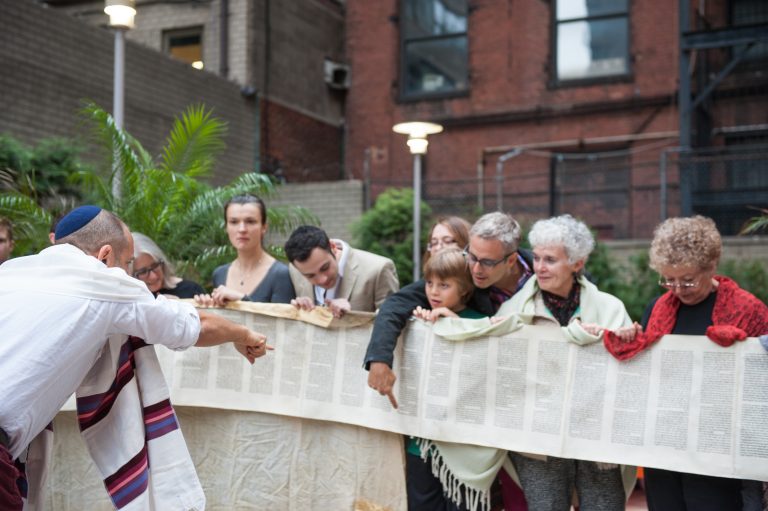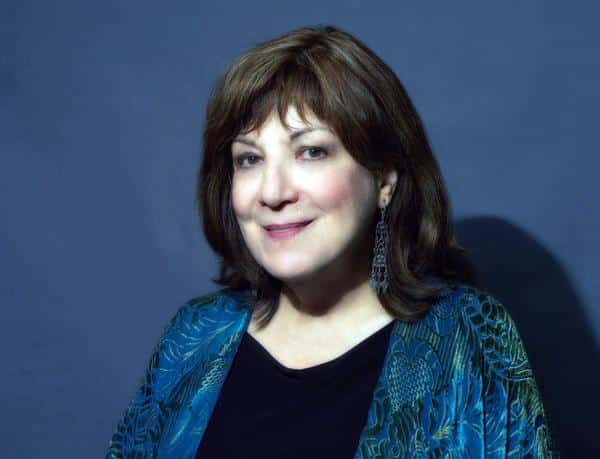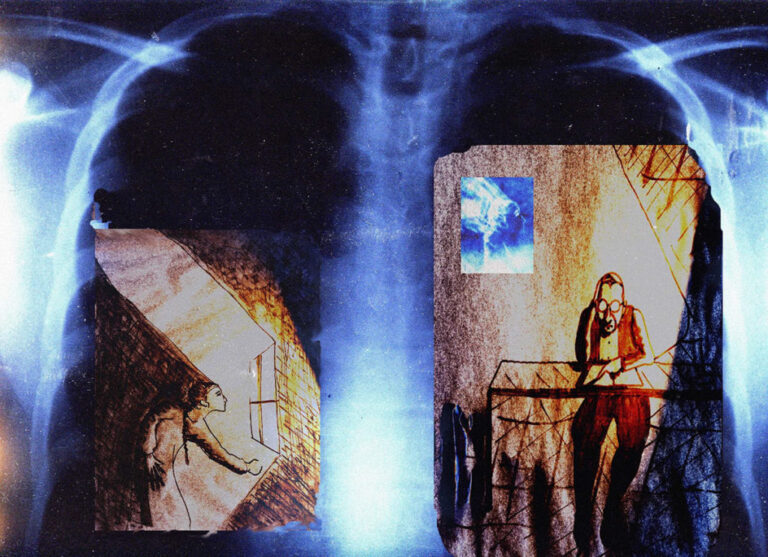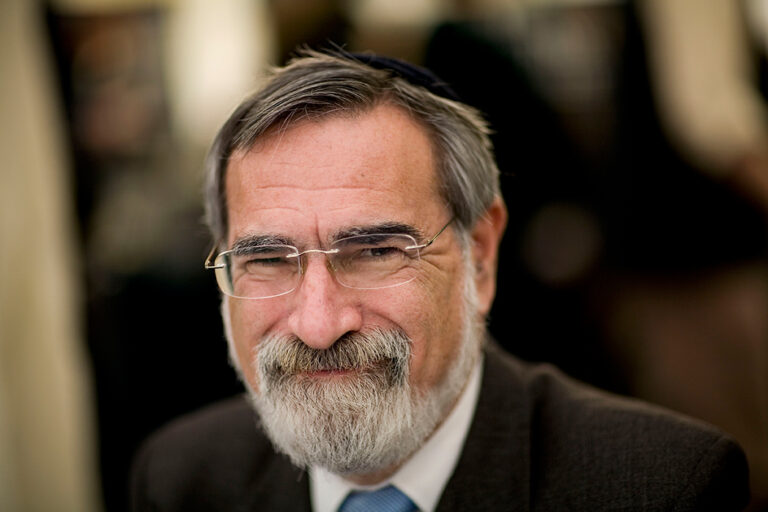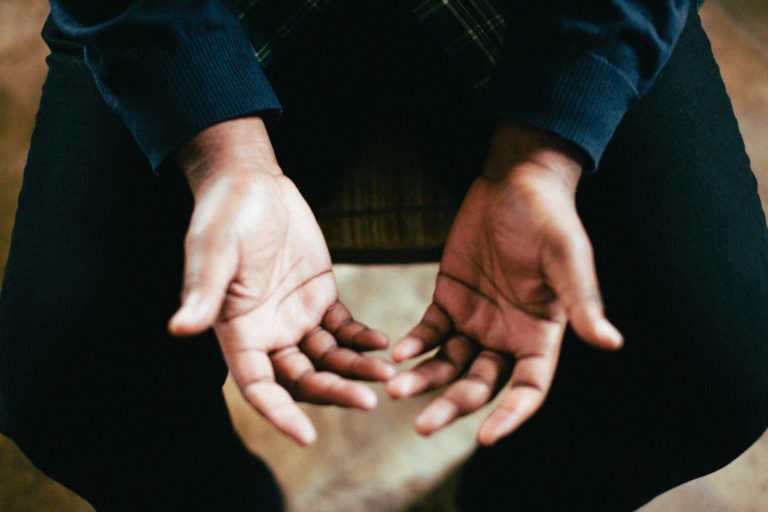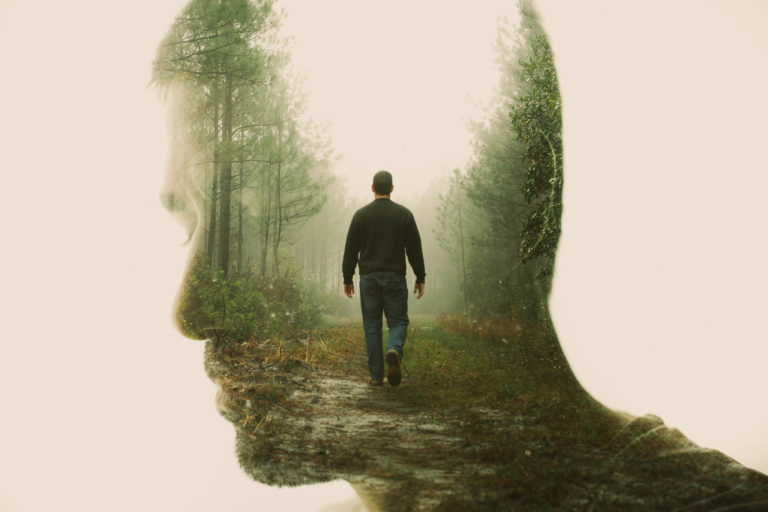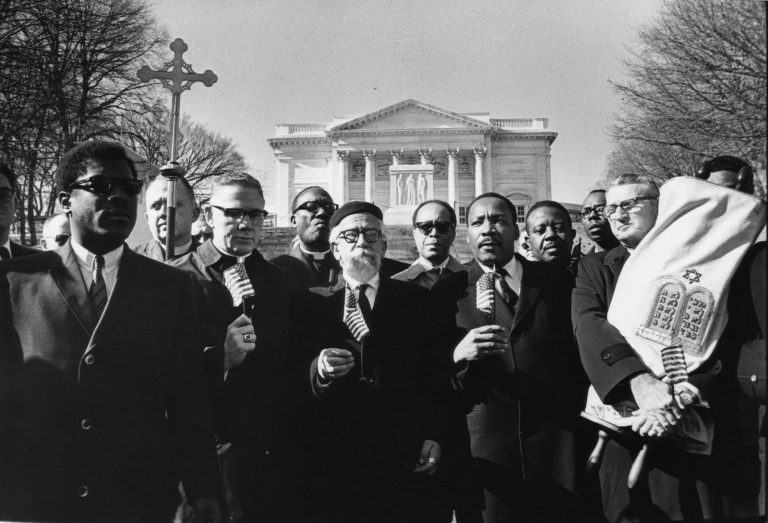We’d heard Derek Black, the former white-power heir apparent, interviewed before about his past, but never about the college friendships that changed him. After Derek’s ideology was outed at the New College of Florida, Matthew Stevenson (one of the only Orthodox Jews on campus) invited him to Shabbat dinner. What happened next is a roadmap for navigating some of the hardest and most important territory of our time.
Judaism
Featured Items
Forms of religious devotion are shifting — and there’s a new world of creativity toward crafting spiritual life while exploring the depths of tradition. Rabbi Amichai Lau-Lavie is a fun and forceful embodiment of this evolution. Born into an eminent and ancient rabbinical lineage, as a young adult he moved away from religion towards storytelling, theater, and drag. Today he leads a pop-up synagogue in New York City that takes as its tagline “everybody-friendly, artist-driven, God-optional.” It’s not merely about spiritual community but about recovering the sacred and reinventing the very meaning of “we.”
View
- List View
- Standard View
- Grid View
19 Results
Filters
You probably know the outline of the Exodus story and its main characters: Moses, the Pharaoh, the burning bush, the plagues, the parting of the sea. And, in another realm of the power of story, the words “let my people go” and the arc of liberation from slavery have inspired people in crisis and catharsis across time and cultures. Call it “myth” if you will — as the Greek Statesman Solon said, myth is not something that never happened. It’s something that happens over and over and over again. Avivah Zornberg walks us through the Exodus story that is relived in the Jewish Passover and resonates through Easter. She is a modern-day master of midrash — the ancient Jewish art of inquiry for discovering the deepest of meaning in and between the biblical lines. What can look simple on the surface, as she reveals, is a cargo of hidden stories that tell the messy, strange, redemptive truth of us as we are and life as it is. Krista and Avivah Zornberg had this lovely, intimate conversation in the early days of this show, in 2005.
There is a question rolling around even in the most secular of corners: What do religious people and traditions have to teach as we do the work ahead of repairing, renewing, and remaking our societies, our life together? Krista’s conversation this week with Rabbi Ariel Burger, a student of the late, extraordinary Elie Wiesel, delves into theological and mystical depths that are so much richer and more creative than is often imagined even when that question is raised.
Rabbi Sacks was one of the world’s deepest thinkers on religion and the challenges of modern life. He died last week after a short battle with cancer. When Krista spoke with him in 2010, he modeled a life-giving, imagination-opening faithfulness to what some might see as contradictory callings: How to be true to one’s own convictions while also honoring the sacred and civilizational calling to shared life — indeed, to love the stranger?
For as far back as Joy Ladin can remember, her body didn’t match her soul. In her mid-40s, Ladin transitioned from male to female identity and later became the first openly transgender professor at an Orthodox Jewish institution. She admits the pain this caused for people and institutions she loved. And she knows what it is to move through the world with the assumed authority of a man and the assumed vulnerability of a woman. We take in what she’s learned about gender and the very syntax of being.
We’d heard Derek Black, the former white-power heir apparent, interviewed before about his past, but never about the college friendships that changed him. After Derek’s ideology was outed at the New College of Florida, Matthew Stevenson (one of the only Orthodox Jews on campus) invited him to Shabbat dinner. What happened next is a roadmap for navigating some of the hardest and most important territory of our time.
Forms of religious devotion are shifting — and there’s a new world of creativity toward crafting spiritual life while exploring the depths of tradition. Rabbi Amichai Lau-Lavie is a fun and forceful embodiment of this evolution. Born into an eminent and ancient rabbinical lineage, as a young adult he moved away from religion towards storytelling, theater, and drag. Today he leads a pop-up synagogue in New York City that takes as its tagline “everybody-friendly, artist-driven, God-optional.” It’s not merely about spiritual community but about recovering the sacred and reinventing the very meaning of “we.”
Rabbi Lawrence Kushner is a long-time student and articulator of the mysteries and messages of Kabbalah, the Jewish mystical tradition. Kushner says mysticism tends to appear when religion — whatever the tradition — becomes too formal and logical. “The minute mysticism becomes permissible, acceptable, possible, it’s an immediate threat to organized religious structures,” he says. “Because what mysticism does is it gives everybody direct unmediated personal access to God.” He is influenced by the Jewish historian Gershom Scholem, who resurrected Kabbalah from obscurity in the 20th century and made it accessible to modern people.
The tensions of our time are well-known. But there are stories that are not being told, because they are not violent and not shouting to be heard. One of them is that all over this country, synagogues and mosques, Muslims and Jews, have been coming to know one another. There is friendship. There are initiatives that are patiently, and at human scale, planting the seeds for new realities across generational time. As part of the Civil Conversations Project, a live conversation at the Union for Reform Judaism’s General Assembly in Boston between Imam Abdullah Antepli and Rabbi Sarah Bassin.
November 9, 2017
Rachel Yehuda
How Trauma and Resilience Cross Generations
The new field of epigenetics sees that genes can be turned on and off and expressed differently through changes in environment and behavior. Rachel Yehuda is a pioneer in understanding how the effects of stress and trauma can transmit biologically, beyond cataclysmic events, to the next generation. She has studied the children of Holocaust survivors and of pregnant women who survived the 9/11 attacks. But her science is a form of power for flourishing beyond the traumas large and small that mark each of our lives and those of our families and communities.
September 21, 2017
Arnold Eisen
The Spiritual Audacity of Abraham Joshua Heschel
“In a free society, some are guilty, but all are responsible.” A mystic, a 20th-century religious intellectual, a social change agent, Rabbi Abraham Joshua Heschel marched alongside Martin Luther King, Jr., famously saying afterwards that he felt his legs were praying. Heschel’s poetic theological writings are still read and widely studied today. His faith was as much about “radical amazement” as it was about certainty. And he embodied the passionate social engagement of the prophets, drawing on wisdom at once provocative and nourishing.
Fundamental forces of physics somehow determine everything that happens, “from the birth of a child to the birth of a galaxy.” Yet physicist Leonard Mlodinow has an intriguing perspective on the gap between theory and reality — and the fascinating interplay between a life in science and life in the world. As the child of two Holocaust survivors, he asks questions about our capacity to create our lives, while reflecting on extreme human cruelty — and courage.
The High Holy Days create an annual ritual of repentance, both individual and collective. Louis Newman, who has explored repentance as an ethicist and a person in recovery, opens this up as a refreshing practice for every life, even beyond the lifetime of those to whom we would make amends.
David Hartman died a year ago this week. The Orthodox rabbi was a charismatic and challenging figure in Israeli society, called a “public philosopher for the Jewish people” and a “champion of adaptive Judaism.” We remember his window into the unfolding of his tradition in the modern world — Judaism as a lens on the human condition.
What may one of the great literary teachers of Torah and midrash — the Jewish tradition of reading between the lines of the Bible to uncover hidden layers of meaning — teach us about our own human longings? Hear what happens when she takes on Noah and the Flood, and Adam and Eve in the garden.
A new show from Jerusalem with American-Israeli journalist Yossi Klein Halevi, who says Jerusalem is a place where the essential human story plays itself out with particular intensity.
We delve into the world and meaning of the Jewish High Holy Days — ten days that span the new year of Rosh Hashanah through Yom Kippur’s rituals of atonement. A young rabbi in L.A. is one voice in a Jewish spiritual renaissance that is taking many forms across the U.S. The vast majority of her congregation are people in their 20s and 30s, who, she says, are making life-giving connections between ritual, personal transformation, and relevance in the world.
More and more people in our time are disconnected from religious institutions, at least for part of their lives. Others are religious and find themselves creating a family with a spouse from another tradition or no tradition at all. And the experience of parenting tends to raise spiritual questions anew. We sense that there is a spiritual aspect to our children’s natures and wonder how to support and nurture that. The spiritual life, our guest says, begins not in abstractions, but in concrete everyday experiences. And children need our questions as much as our answers.
A survivor of the Holocaust, in which he lost most of his family, Wiesel was a seminal chronicler of that event and its meaning. Wiesel shares some of his thoughts on modern-day Israel and Germany, his understanding of God, and his practice of prayer after the Holocaust.
The Pause
Join our constellation of listening and living.
The Pause is a monthly Saturday morning companion to all things On Being, with heads-up on new episodes, special offerings, event invitations, recommendations, and reflections from Krista all year round.
Search results for “”
View
- List View
- Standard View
- Grid View
Filters
